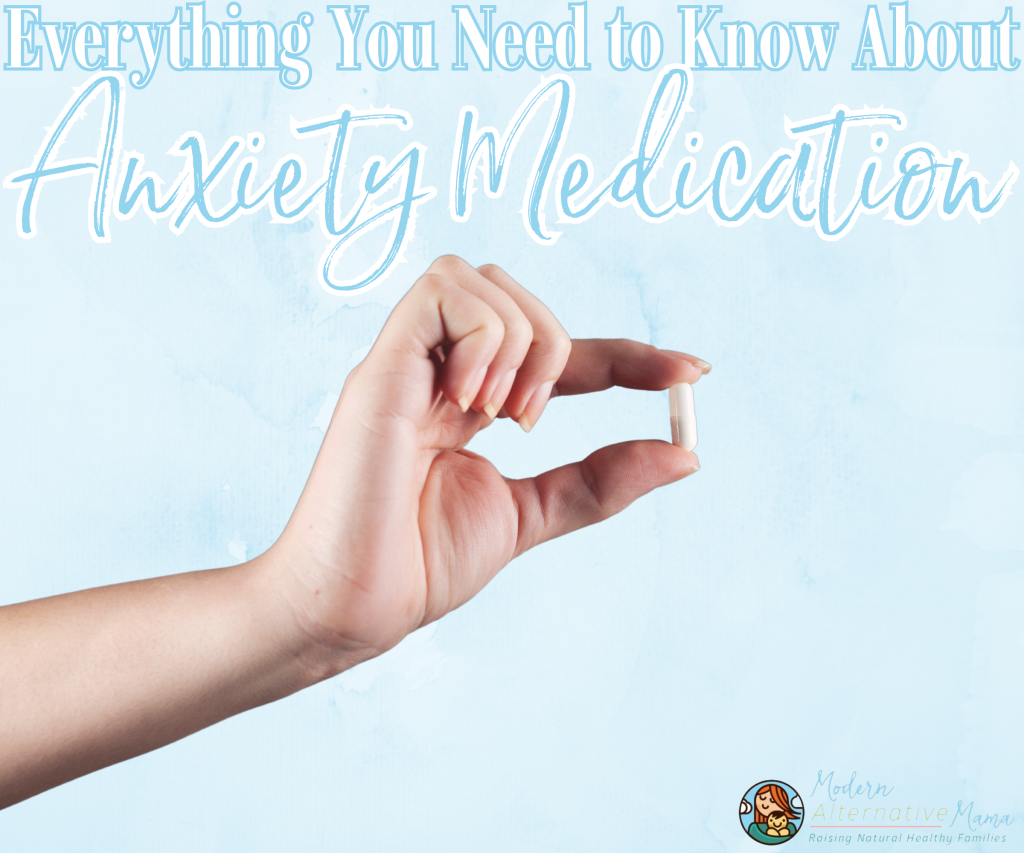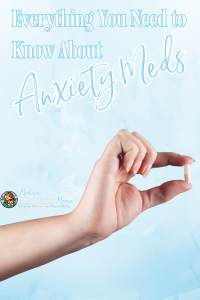Although I do not personally struggle with anxiety, someone I love does – my husband. I spoke in great detail about how to support a loved one with anxiety, and sometimes, that looks like supporting them through anxiety medication side effects (at least it did for me).
First and foremost, understand you are not alone. Approximately twenty percent of American adults are affected by anxiety, and about 264 million individuals worldwide have an anxiety disorder (1,2). Additionally, 1 in 4 people will be affected by a mental illness at some point (2). Again, you are not alone.
With anxiety at an all-time high, it’s no wonder prescriptions for anti-anxiety medications rose 10.2% in the U.S. from 8.8 million in 2019 to 9.7 million in 2020 (3).
What Is Anxiety Medication
Anxiolytics (anti-anxiety medications) are prescription medications used to treat anxiety. Of course, a healthcare provider may prescribe anxiolytic medications for depression, chronic pain, insomnia, or other health conditions. If you’re looking into anxiolytics, you’re likely already familiar with what anxiety is, but just to recap:
Anxiety is a sudden feeling of intense fear or terror that reaches a peak within minutes, also known as a panic attack (4). When the body is stressed, the sympathetic nervous system (SNS) contributes to what is known as the “fight or flight” response (5). The fight, flight or freeze response is an evolved survival mechanism that protects us from perceived threats (6). Unfortunately, the body can also overreact to everyday stressors, making many of us stuck in fight-or-flight mode.
Aside from everyday stressors, we sometimes deal with particularly high-stress situations, such as the death of a loved one, long-term emotional abuse, chronic illness, or job loss. The variety of stressors can keep our cortisol levels up all day, resulting in difficulties calming down after high-stress situations, becoming easily stressed, or even more prone to anxiety.
Learn more about anxiety in our blog, Natural Ways to Reduce Stress & Anxiety.
Like most pharmaceuticals, there are different classes of anxiolytics, including (7)
- Antidepressants
- Antihistamines
- Azapirones
- Barbiturates (no longer used for anxiety)
- Benzodiazepines
- Beta-blockers
- Nonbenzodiazepines (also known as Z-drugs)
- Sedative-hypnotics
Every class of anxiolytics has a risk of side effects, so let’s discuss the overall risks associated with anxiolytics.
Risks of Anxiety Medication
The risks of anxiolytics are often worse than the symptoms of anxiety. Have you ever heard the commercials for antidepressants, often used to treat anxiety disorders?
“This medication is not for everyone. Call your doctor about unusual changes in behavior, worsening depression, or thoughts of suicide. Antidepressants can increase these in those 24 and younger. Elderly dementia patients taking this medication have an increased risk of death or stroke. Call your doctor if you have high fever, stiff muscles, and confusion to address a possible life-threatening condition or if you have uncontrollable muscle movements, as these may be permanent. High blood sugar was reported with this medication and, in extreme cases, can lead to coma or death. Other risks are increased cholesterol, weight gain, decreased white blood cells, which can be serious, dizziness on standing, seizures, trouble swallowing, and impaired judgment or motor skills.”
Learn more about the risks of antidepressants in our blog, Everything You Need to Know About Antidepressants.
Risks associated with anxiolytic usage include (8,9):
- Slurred speech
- Low heart rate
- Low blood pressure
- Irregular breathing
- Memory loss
- Confusion
- Depression
- Dizziness
- Faulty judgment
- Nausea
- Vomiting
- Diarrhea
- Constipation
- Abdominal pain
- Nightmares
- Mood swings
- Aggressive behavior
- Vision problems
- Sleep problems
- Breathing problems
- Liver damage
- Sexual problems
- Chronic fatigue
- Seizures
- Breathing problems
- Abuse, dependency, or withdrawal symptoms
- Suicidality
- Fainting
- Drowsiness
- Difficulty urinating
- Mood changes
- Trouble concentrating
- Blurred vision
- Headaches
- Severe movement problems
- Serotonin syndrome
- Dry mouth
- Numbness
I’d also like to note that reports show about 25 percent of people who are given anxiolytics do not have a proper diagnosis. That’s mindboggling, considering people who use anxiolytics have a 36 percent increased mortality risk (10).
This is quite the list of potential side effects and, honestly, quite overwhelming. For some, anxiolytics may be the only choice, and that’s okay. Looking for support? Check out our blog, When Mama Needs Support (and How to Find it), which is great for anyone, not just mamas.
Herbs With Anti-Anxiety Properties
It still blows my mind that we prescribe potentially harmful anxiolytics as a first line of defense against anxiety instead of considering other factors. For instance, doctors rarely consider the gut-brain connection, foods for mental health, adaptogens, or natural ways to reduce anxiety, like essential oils and herbs to help manage anxiety symptoms.
Ashwagandha
Ashwagandha helps lower cortisol levels and has been used by researchers to regulate chemical signals in the nervous system of animals and found that ashwagandha blocks the stress pathway of rats (11). Researchers didn’t stop at animal studies; they also studied humans. They successfully reduced human stress by using ashwagandha in a 60-day study of 64 people with chronic stress. In that study, 69 percent reported reduced stress, anxiety, and insomnia (12).
Chamomile
Chamomile contains an antioxidant known as apigenin, also found in parsley and oregano (13). Apigenin binds to specific brain receptors and may reverse chronic mild stress, lower stress-induced alterations, and promotes restful sleep (14,15). A study involving postpartum women who drank chamomile tea for two weeks reported better sleep quality and fewer symptoms of depression (often linked with sleeping problems) than the group that did not (16).
Lavender
Lavender is most commonly used for its sedative-like effect. Studies have shown that lavender oil can positively affect symptoms associated with anxiety. One study found that lavender oil was equivalent to lorazepam in its starting dose in patients with subsyndromal anxiety (17). Additionally, the inhalation of lavender oil has been found to influence vital signs and anxiety (18).
Skullcap
Skullcap positively impacts mood and reduces anxiety by stimulating gamma-aminobutyric acid (GABA), a neurotransmitter that helps calm nerves (19). In fact, many anti-anxiety pharmaceutical medications work by enhancing GABA activity (20). One study found that those who received 1,050 mg of American skullcap daily for two weeks reported significant enhancements in mood compared to the placebo group (21).
Yarrow
Yarrow studies indicate that yarrow reduces the secretion of corticosterone, an elevated hormone during chronic stress (22), thanks to compounds like alkaloids (23). Another study successfully reduced anxiety and encouraged daily mental and physical activity in rats when orally administered yarrow essential oil (24). Remember, we do not recommend ingesting essential oils unless under the direct supervision of an aromatherapist or naturopath, which we will discuss more under safety concerns.



